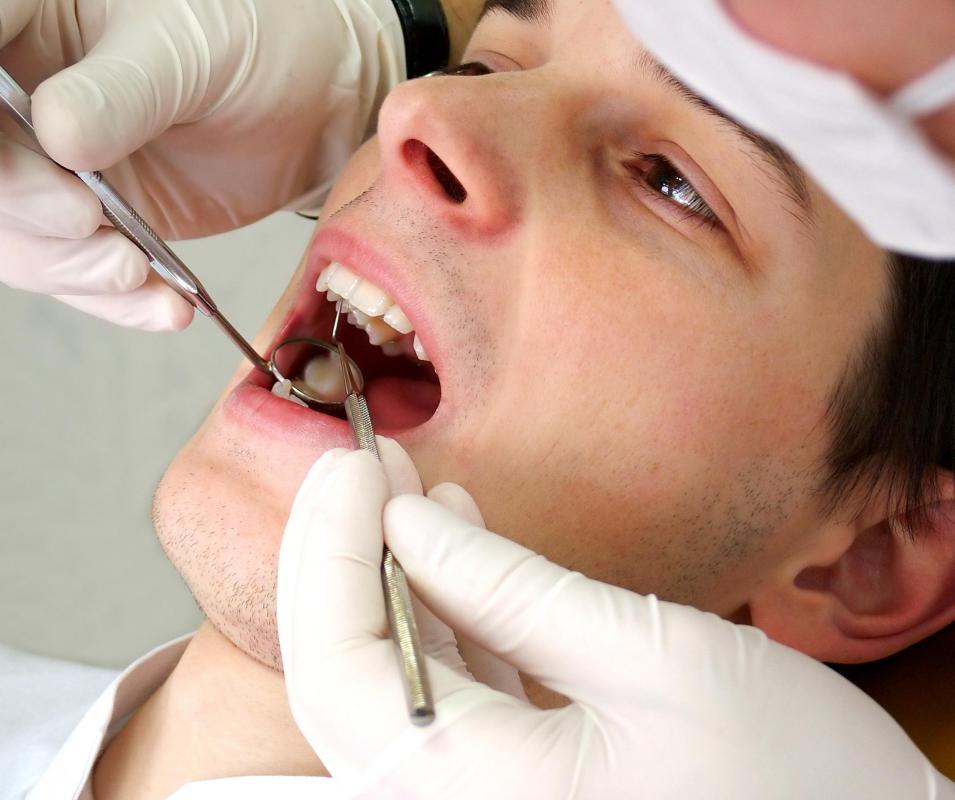At WiseGEEK, we're committed to delivering accurate, trustworthy information. Our expert-authored content is rigorously fact-checked and sourced from credible authorities. Discover how we uphold the highest standards in providing you with reliable knowledge.
What is Dental Plaque?
Dental plaque is a type of biofilm, a colony of microorganisms suspended in fluid and mucus, which builds up on the teeth. When left unattended, dental plaque can cause serious oral health problems, and it can eventually develop into tartar, a mineralized form of dental plaque which is very damaging, and very difficult to remove from the teeth. Fortunately, there are a number of ways to combat dental plaque and keep the mouth healthy.
This buildup in the mouth is entirely natural, and it typically contains a broad cross section of the bacteria which call the mouth home. It starts as a bacterium touches down on a tooth, taking advantage of the warm, moist environment of the mouth to start multiplying and attracting additional bacteria. As the bacteria accrue, they are gummed together by mucus and the secretions emitted by some of the bacteria, creating a filmy layer on the surface of the tooth.

At this stage, dental plaque is quite easy to remove; a quick sweep with a toothbrush will take most of the bacteria away, forcing them to start from scratch if they want to build up another layer of dental plaque. The dental plaque is also not very harmful at this stage. If the dental plaque is allowed to progress, however, things can get ugly.
In an extremely thick layer of dental plaque, the bacteria at the bottom will start to respire anaerobically, because they lack oxygen. Anaerobic respiration, in addition to being a neat survival trick, also produces acids which can eat into the surface of the teeth, causing damage. If allowed to continue growing, a dental plaque will also start to mineralize, as discussed above.

Dental plaque can also host harmful bacteria, including foreign invaders which might cause damage to the body. A bacterial imbalance in the body can also lead to a proliferation of harmful bacteria in the mouth, and these bacteria may start to generate odors and stains which are aesthetically unpleasant in addition to being unhealthy.
Most dentists recommend that people floss, brush, and use mouthwash regularly to remove dental plaque and to cut down on overall levels of bacteria in the mouth. Additionally, annual visits to an oral hygienist to remove stubborn dental plaque are also advised; such visits also give a dentist a chance to check on the patient's general oral health.
AS FEATURED ON:
AS FEATURED ON:

















Discussion Comments
I think that many people end up with dental plaque because they are afraid to go to the dentist for regular cleanings. Having these done at least twice a year is very important to avoid cavities.
If you having your teeth cleaned frightens you, have a talk with your dentist. There are options available to help you get through your cleanings so you can keep your teeth looking great.
Plaque is more likely to build up and cause tooth decay if you don't brush your teeth for enough time each morning and night. A good rule of thumb to follow is the brush them for at least 2 minutes up and down, side to side, and in a circular motion. Make sure you reach all of the surfaces of each tooth and don't forget to floss!
Post your comments